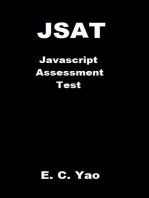What will be the output of the following C code
Uploaded by
Anithadevi NWhat will be the output of the following C code
Uploaded by
Anithadevi NBringal
What will be the output of the following C code?
1. #include <stdio.h>
2. void main()
3. {
4. m();
5. }
6. void m()
7. {
8. printf("hi");
9. m();
10. }
a) Compile time error
b) hi
c) Infinite hi
d) Nothing
View Answer
Answer: c
Explanation: None.
Point out the error in the program
#include<stdio.h>
int f(int a)
{
a > 20? return(10): return(20);
}
int main()
{
int f(int);
int b;
b = f(20);
printf("%d\n", b);
return 0;
}
A. Error: Prototype declaration
B. No error
C. Error: return statement cannot be used with conditional operators
D. None of above
Answer: Option C
There is a error in the below program. Which statement will you add to remove it?
#include<stdio.h>
int main()
{
int a;
a = f(10, 3.14);
printf("%d\n", a);
return 0;
}
float f(int aa, float bb)
{
return ((float)aa + bb);
}
A
Add prototype: float f(aa, bb)
.
B
Add prototype: float f(int, float)
.
C
Add prototype: float f(float, int)
.
D
Add prototype: float f(bb, aa)
.
Answer: Option B
Explanation:
The correct form of function f prototype is float f(int, float);
Which of the following statements are correct about the function?
long fun(int num)
{
int i;
long f=1;
for(i=1; i<=num; i++)
f = f * i;
return f;
}
A The function calculates the value of 1 raised to power num.
.
B
The function calculates the square root of an integer
.
C
The function calculates the factorial value of an integer
.
D
None of above
.
Answer: Option C
Explanation:
Yes, this function calculates and return the factorial value of an given integer num.
#include<stdio.h>
int f(int a)
{
a > 20? return(10): return(20);
}
int main()
{
int f(int);
int b;
b = f(20);
printf("%d\n", b);
return 0;
}
Which of the following is a complete function?
A. int funct();
B. int funct(int x) {return x=x+1;}
C. void funct(int) { printf( "Hello");
D. void funct(x) { printf( "Hello"); }
You might also like
- D. Return 2. How Many Times The Program Will Print "DR.K.K" ?No ratings yetD. Return 2. How Many Times The Program Will Print "DR.K.K" ?27 pages
- Test Review: View Answers and Explanation For This Test.: Control Instructions Discuss in ForumNo ratings yetTest Review: View Answers and Explanation For This Test.: Control Instructions Discuss in Forum14 pages
- Basic C Programming MCQquestions For Engineering Student100% (1)Basic C Programming MCQquestions For Engineering Student61 pages
- A1286728257 - 13891 - 25 - 2017 - MCQ Questions CSE1010% (1)A1286728257 - 13891 - 25 - 2017 - MCQ Questions CSE10160 pages
- 2020 - BCA 2 Sem Programming Through C-IISem-BCA2CC08No ratings yet2020 - BCA 2 Sem Programming Through C-IISem-BCA2CC0817 pages
- A - B. C. D .: Answer: Option C ExplanationNo ratings yetA - B. C. D .: Answer: Option C Explanation8 pages
- Unit Ii Functions, Pointers, Structures and Unions SyllabusNo ratings yetUnit Ii Functions, Pointers, Structures and Unions Syllabus35 pages
- Project - Restaurant Rating Prediction: Problem StatementNo ratings yetProject - Restaurant Rating Prediction: Problem Statement3 pages
- LTE Messaging Analysis and Performance Optimization PDFNo ratings yetLTE Messaging Analysis and Performance Optimization PDF229 pages
- 1102 - Chapter 23 Portable Computing - Slide HandoutsNo ratings yet1102 - Chapter 23 Portable Computing - Slide Handouts6 pages
- White Electronic Designs: PCMCIA Flash Memory Card 1 MEGABYTE Through 40 MEGABYTE (Intel/Sharp Based)No ratings yetWhite Electronic Designs: PCMCIA Flash Memory Card 1 MEGABYTE Through 40 MEGABYTE (Intel/Sharp Based)14 pages
- Microsoft Power Bi Full Course Tutorial_17102024No ratings yetMicrosoft Power Bi Full Course Tutorial_17102024176 pages
- PL5 Course Summary Pathloss PTP 3 Days PL5 02No ratings yetPL5 Course Summary Pathloss PTP 3 Days PL5 026 pages

























































































